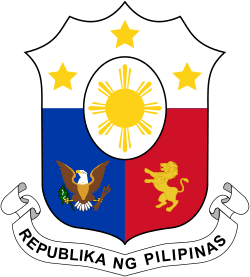Philippines–European Union relations
 |
|
European Union |
Philippines |
|---|---|
The European Union and the Philippines shares diplomatic, economic, cultural and political relations. The European Union has provided €3 million to the Philippines to fight poverty and €6 million for counter-terrorism against terrorist groups in the Southern Philippines. The European Union is also the third largest trading partner of the Philippines. There are more than 30,000 Europeans living in the Philippines (not including Spaniards).
Bilateral relations
The European Union and the Philippines are coming up with more comprehensive bilateral agreement that will further strengthen the dialogue, cooperation, and action in their partnership, specifically the issue of migration. The more than 600,000 Filipinos in Europe.[1] The Philippines exports to the European Union including coconut oil, electronic micro assemblies, electrical and electronic machinery, equipment, semiconductor devices, storage units, static converters, other brakes and servo-brakes and parts, and digital monolithic integrated circuits.[2]
Agreement
An agreement signed covers legal migration, maritime labor, education and training. The agreement also provides for dialogue and cooperation on political matters including the peace process on trade and investment such as customs facilitation and intellectual property rights on justice and security.[3]
Trade
| EU – Philippines trade in 2011.[4] | ||||
|---|---|---|---|---|
| Direction of trade | Investment flow | Investment stocks | Others | |
| EU to the Philippines | € 9 billion | € 5 billion | € 1.1 billion | |
| Philippines to EU | € 7.9 billion | € 430 million | € 1.7 billion | |
Humanitarian aid
In December 2011, Northern Mindanao was devastated by Tropical Storm Washi. The European Commission allocated €3 million ($3.9 million) to provide emergency relief to people affected by Tropical Storm Washi.[5] In December 2012, the European Commission is providing € 10 million (PH₱ 543 million) for the victims of Typhoon Bopha, notably in the provinces of Compostela Valley and Davao Oriental in Mindanao.[6] After Typhoon Haiyan in November 2013, the European Commission announced a donation of €3 million to be made for the victims affected by the tropical storm.[7]
Commercial aviation
The Philippines are among the countries with air carriers banned in the European Union. However, in 2013, the European Union lifted a three-year ban on Philippine Airlines flying into its airspace after the national carrier addressed safety concerns. The European Commission and the Air Safety Committee are encouraged by the actions being taken by the Civil Aviation Authority of the Philippines and Philippine air carriers to address outstanding safety issues.[8] In April 2014, the European Union lifted its ban on Cebu Pacific, making it the second airline in the Philippines with granted rights to fly within the European Union airspace.[9]
References
- ↑ "Philippines-European Union Partnership, Cooperation". Tempo. July 7, 2012.
- ↑ "Philippines, EU sign new framework for partnership". InterAksyon. July 12, 2012.
- ↑ "Philippines-European Union Partnership, Cooperation". Tempo. July 7, 2012.
- ↑ "Trade, Investment and Financial Links". EU Delegation to the Philippines. July 19, 2013.
- ↑ "EC mobilizes funds to help ‘Sendong’ victims". Inquirer. December 23, 2011. Retrieved December 23, 2011.
- ↑
- ↑ "The EU Responds to Haiyan Disaster with Coordinated Relief Efforts". Delegation of the European Union to the United States. Retrieved 4 November 2014.
- ↑ "European Union lifts safety ban on Philippine Airlines". EUbusiness. July 10, 2013.
- ↑ "European Commission lifts ban on Cebu Pacific". Cebu Pacific. 11 April 2014. Retrieved 4 November 2014.
External links
| |||||||||||||||||||||||||||||||||||||||||||||||||||||||||||||||||||||||||||||||||||||||||||||||
